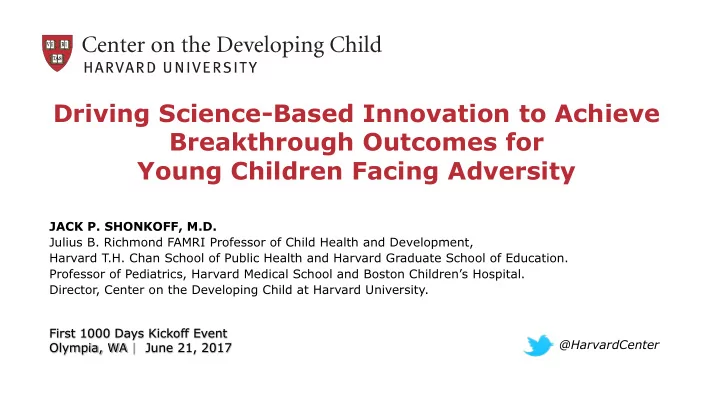

Driving Science-Based Innovation to Achieve Breakthrough Outcomes for Young Children Facing Adversity JACK P. SHONKOFF, M.D. Julius B. Richmond FAMRI Professor of Child Health and Development, Harvard T.H. Chan School of Public Health and Harvard Graduate School of Education. Professor of Pediatrics, Harvard Medical School and Boston Children’s Hospital. Director, Center on the Developing Child at Harvard University. First 1000 Days Kickoff Event @HarvardCenter Olympia, WA | June 21, 2017
Three Core Scientific Concepts Underscore the Importance of the First 1000 Days Responsive relationships and positive experiences build 1 strong brain architecture, starting in the earliest years of life. Coaching, modeling, and practice 2 support the development of key capabilities that are needed to thrive in school, at work, as a parent, and as a contributing member of a community. Significant adversity can disrupt 3 the early development of these capabilities as well as the ability to rely on them later under conditions of duress.
Capabilities that Promote Healthy Development are Built on Foundational Skills in Executive Function and Self-Regulation These core dimensions of development include the ability to: Error focus and sustain attention • Processing set goals, make plans, and Behavioral • Reaction Control monitor actions and Working Use of make decisions and solve Responses • Memory Rules problems Risk/Reward Decisions follow rules, control impulses, • Emotions and delay gratification
The Challenge: The Ability to Change Brains and Behavior Decreases Over Time Normal Brain Plasticity Physiological “ Effort ” Influenced by Required to Modify Experience Neural Connections Birth 10 20 30 40 50 60 70 Age (Years) Source: Levitt (2009)
Two Windows for Intervention: The Development of Executive Function Skills Begins in Early Childhood and Extends Into the Early Adult Years Skill proficiency Birt 3 5 10 15 25 30 50 70 80 h Weintraub, et al. (2011) Age (Years)
Leveraging Science to Strengthen Current Efforts and Drive Innovation in Policies & Programs Children Adults Educational Achievement Positive Parenting & & Lifelong Health Economic Stability Build Strengthen Responsive Core Life Skills Relationships Reduce External Sources of Stress
Why These Three Principles? For children: promotes heathy development of brain • architecture, biological stress response, Build attachment & social-emotional capacities provides buffering protection to prevent • Responsive even very challenging experiences from Relationships producing a toxic stress response For adults: provides practical and emotional support • helps build hope and confidence • models relationship skills •
Why These Three Principles? For children: Support educational & social success • Resist decisions that risk health • Strengthen For adults: Core Life Needed to succeed in the workplace • Better able to provide responsive care • Skills Better able to maintain stable home • environment For both: Promote agency, belief in self • Better able to manage stress •
Why These Three Principles? For children: Encounter fewer and briefer situations • that trigger an extreme stress response Reduce Directly promotes brain development, • External health, and well-being Sources For adults: of Stress Open up “bandwidth” to promote the • healthy development of children Enable more effective access and use of • core capabilities More opportunities for responsive • caregiving
Innovation is About Co-Creation and Intervention Risk-Taking Developers Solution Integrators Have ideas for Seek solutions to unmet needs of the children and improving outcomes families they serve Identify Develop Unmet Needs Replicable & Promising Interventions Targets Knowledge Test, Learn, Share Science Practice Ready Teams/Locations Mindset, skills, leadership • Community Policy Engagement of target population • Clear definition of an unmet need • Appropriate funding •
The Time Has Come to Really Find Out What Works — and How, for Whom, and in What Contexts We rarely know precisely what an “evidence - based” intervention actually does and why or how it changes developmental trajectories. We know even less about for whom it produces a large effect and for whom it has very little or no impact. It’s time to shift from a 20 th century agenda focused on proof of concept and returns on investment to a 21 st century quest for larger impacts at scale.
Understanding Human Variability is Essential for Developing and Implementing More Effective Policies and Programs Source: NLSCY, Cycle 4 (2000-01)
Achieving Greater Impact at Scale Requires Rethinking the Criteria for Defining Evidence-Based Investments What We Should Ask Why did this work so well for these children and families? Current Approach Significant mean effect earns evidence-based status 0 Why did this work so poorly for these children and families?
Achieving Greater Impact at Scale Requires Rethinking the Criteria for Defining Evidence-Based Investments Scale effective strategies for similar subgroups Build a suite of programs and policies across sectors that matches different strategies to different resources, needs, and outcomes Design and test new approaches for these subgroups
Lessons We’ve Learned Over the Past Five Years Identifying specific challenges or unmet needs Balancing rigorous criteria and flexibility for design, testing, and evaluation Activating untapped energy across sectors, agencies, and systems – and emphasizing the importance of risk taking and learning from failure Recognizing the challenge of building adult capabilities in early childhood settings
Greater Impacts in Contexts or Systems that Intersect with Early Childhood Require a Full Spectrum of Engagement Delivering state of the art Meeting standards and increasing access Adapting and scaling promising new strategies in Basic quality existing systems issues that must be Generating and addressed testing new approaches and policies across sectors (Adapted from Everett Rogers, Diffusion of Innovations, 2003)
The Fundamental Importance of Strategic Collaboration and the Benefits of Productive Collisions “Encouragement does not necessarily lead to creativity. Collisions do — the collisions that happen when different fields of expertise converge in some shared physical or intellectual space. That’s where the true sparks fly.”
www.developingchild.harvard.edu @HarvardCenter
Recommend
More recommend